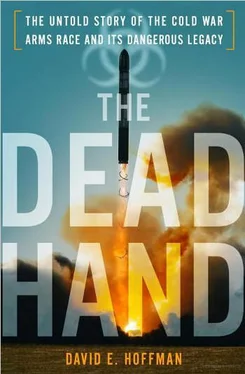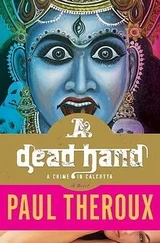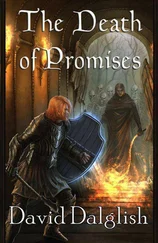4 U.S. Congress, Office of Technology Assessment, Technologies Underlying Weapons of Mass Destruction OTA-BP-ISC-115 (Washington, D.C.: U.S. Government Printing Office, December 1993), p. 96. See W. Seth Carus, Bioterrorism and Biocrimes: The Illicit Use of Biological Agents Since 1900 (Amsterdam: Fredonia Books, 2002), pp. 17 and 23.
5 Ken Alibek with Stephen Handelman, Biohazard: The Chilling True Story of the Largest Covert Biological Weapons Program in the World—Told from Inside by the Man Who Ran It (New York: Random House, 1999), pp. 139–140.
6 Cooper, p. 105; and Adams, Ch. 20, pp. 270–283.
7 Davis, interviews.
8 Alibek, interview, June 18, 2007, and Alibek, pp. 137, 143.
9 Jones interview by Glenn Frankel of the Washington Post in London, August 10, 2004.
10 Alibek confirmed this. “Plague and smallpox were considered strategic weapons” by the Soviet Union, he told the author. In 1992, Davis was honored by Queen Elizabeth, who recognized his contribution to proving that the Soviet Union had a massive strategic biological weapons program.
11 Pasechnik described Soviet research into three key areas: characteristics of each pathogen, susceptibility of targets and vulnerability of users. They tried to improve the production rates and the yield of viable, live microorganisms; increase virulence; boost resistance to antibiotics; maximize viability of the germs during and after dissemination; degrade defenses of the human target; protect the person who launched the pathogens by vaccination; and come up with better detection systems to warn the user.
12 Gorbachev, Memoirs , p. 524.
13 The press conference by Guenter Schabowski at the GDR International Press Center took place just before 7 P.M. Cold War International History Project, translated by Howard Sargent.
14 25 Weekly Comp. Pres. Docs. 1712, Nov. 9, 1989. Bush said Gorbachev sent him a message that day asking the United States not to overreact. George Bush and Brent Scowcroft, A World Transformed (New York: Knopf, 1998), pp. 148–151.
15 Masterpieces , p. 242.
16 A U.S. participant told the author BW issues were not included in the staff papers for the summit, nor mentioned by Bush to Gorbachev.
17 “On Improvement of Organization of Works on Special Problems,” Katayev, Hoover.
18 Alibek, p. 150.
19 This account is based on documents from Katayev, Hoover, including Yazov’s protest, “On the draft resolution of the Tsk KPSS ‘On directives to the USSR delegation at the Soviet-American consultations on issues of banning bacteriological and toxin weapons,’” signed by Yazov January 10, 1990; Karpov’s response, January 11, 1990, in a letter to Lazarev, V. F.; and a separate spravka signed by N. Shakhov, deputy head of Katayev’s department, outlining the official position on the Sverdlovsk accident.
20 MacEachin’s job was to synthesize the intelligence from several agencies for the ungroup, as well as describing how the agencies differed, and to seek data from the agencies when the ungroup needed it.
21 MacEachin, interview, July 25, 2005.
22 Ross, interview, June 2, 2008.
23 Anatoly Chernyaev, My Six Years with Gorbachev (University Park, Pa.: University of Pennsylvania Press, 2000), p. 244.
24 James A. Baker III, The Politics of Diplomacy: Revolution, War and Peace, 1989–1992 (New York: G. P. Putnam’s Sons, 1995), p. 240. Akhromeyev said Shevardnadze’s February concession was “just his mistake.” Sergei Akhromeyev and Georgi M. Kornienko, Glazami Marshala i Diplomata (Moscow: International Relations, 1992), p. 273.
25 A similar thought was expressed by Akhromeyev at a meeting in Zaikov’s office to discuss biological weapons. Katayev took notes, although the date is not clear. The subject was preparing the biological weapons facilities for possible inspection. Katayev noted that Akhromeyev said, “from 6 to 12 months is required to resume the production.” Katayev, Hoover.
26 Alibek, pp. 177–178.
27 The instructions sidestepped past violations. “Additional directives for the USSR delegation to the Soviet American consultations on question of prohibition of bacteriological and toxin weapons,” Central Committee, no date. A cover sheet indicates Politburo approval April 25, 1990, and that they were an expansion of April 2 directives along similar lines. Courtesy Svetlana Savranskaya.
28 Alibek, pp. 189–191.
29 Matlock, communication with author, May 27, 2008.
30 “Memorandum of conversation between the U.S. ambassador to the USSR, J. Matlock, and the British ambassador, R. Braithwaite,” May 14, 1990, Katayev, Hoover. Braithwaite provided a diary extract for the May 14 meeting.
31 “To the President of the Union of Soviet Socialist Republics, Comrade M. S. Gorbachev,” May 15, 1990, Katayev, Hoover. This document is strong evidence that, by this point, Gorbachev and Shevardnadze did know of the offensive biological weapons program, as Pasechnik had said.
32 The term recipe in this context generally meant a biological weapons preparation.
33 It is not known how much of this was true. Some of it is confirmed by the fragmentary Katayev handwritten notes from the meetings in 1989, in which dismantlement was discussed, but at the time, they were still debating whether to preserve the equipment. Other evidence, including Pasechnik’s debriefings, indicated that pathogens were still being tested, manufactured and weaponized in 1989.
34 The two earlier decisions were taken Dec. 6, 1989, and March 16, 1990, after the Pasechnik defection.
35 Two of the sites he identified had been used in the pre-1969 biological weapons program: the Dugway Proving Ground in Utah and the Pine Bluff, Arkansas, storage facility. A third site he mentioned was described as a private company, Cetus Corporation, of Amityville, California, which has never been found.
36 Interviews with Baker on Sept. 4, 2008; MacEachin, July 25, 2005; Ross, June 2, 2008. Shevardnadze’s formal instructions for the ministerial meeting with Baker were to repeat that the Soviet side wanted to strengthen trust and broaden openness on the topic. See Fond 89, perechen 10, Delo 61, Hoover. Baker described the visit to Zagorsk in his memoir, The Politics of Diplomacy , p. 248, but did not mention the BW paper. Baker also described the ride to Zagorsk in an interview for the PBS Frontline documentary Plague War , aired Oct. 13, 1998. See www.pbs.org/wgbh/pages/frontline/shows/plague/interviews/baker.html .
37 Rodric Braithwaite, Across the Moscow River (New Haven: Yale, 2002), pp. 141–143.
38 Baker, p. 247.
39 See Raymond L. Garthoff, The Great Transition (Washington, D.C.: Brookings Institution, 1994), pp. 425–428; Beschloss and Talbott, pp. 219–228; Don Oberdorfer, From the Cold War to a New Era (Johns Hopkins University Press, 1998), pp. 410–430; Baker, p. 253; Bush and Scowcroft, p. 283.
40 Matlock said that at first “the bureaucracy in Washington was not happy with the idea of reciprocal visits. They said, in effect, they are violating, we are not. Why should we show them what we are doing? I argued that we should accept reciprocal visits: What did we have to lose?” Matlock, communication with author May 27, 2008.
41 Gorbachev, interview, June 10, 2004.
42 Braithwaite says Thatcher “tackled Gorbachev much more directly” than had her defense minister on biological weapons. “Gorbachev claimed to know nothing but promised to investigate. Intelligence analysts in London and Washington, many of whom still thought there was little to choose between Gorbachev and his predecessors, believed that he knew perfectly well what was going on, and was party to his generals’ deliberate deception,” pp. 141–143. By another account, Thatcher threatened to put Pasechnik on television around the world if Gorbachev didn’t cooperate. Tom Mangold and Jeff Goldberg, Plague Wars (New York: St. Martin’s Griffin, 1999), p. 111.
Читать дальше












